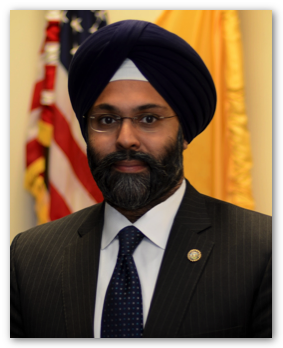Grewal Sues EPA over 'Failure to Protect NJ from Out-Of-State Ozone Pollution'

Lawsuit Demands EPA Hold Upwind States to Their “Good Neighbor” Obligations to Reduce Ozone Pollution That Enters New Jersey and Harms Residents’ Health
TRENTON – Acting to protect residents from the dangers of ozone pollution, Attorney General Gurbir S. Grewal today joined a multi-state lawsuit challenging the U.S. Environmental Protection Agency’s (EPA) refusal to impose tougher emissions standards on upwind states that are home to coal-burning power plants.
Ozone pollution—caused largely by nitrogen oxide (NOx) emissions—can damage the lining of the lungs and lung tissue, and can aggravate asthma. Children and individuals with respiratory conditions are particularly susceptible. Even though New Jersey has some of the strictest limits on NOx in the United States, EPA deems some counties out of compliance with federal standards for ground-level ozone, largely due to emissions coming in from coal-burning power plants in states like Illinois, Indiana, Kentucky, Michigan, Ohio and West Virginia.
In today’s petition in the D.C. Circuit Court of Appeals, New Jersey—along with other northeast states—seeks to hold EPA to its promise to impose stricter ozone emissions standards on upwind states. In December 2018, however, EPA finalized a rule that failed to require any additional emissions reductions from the upwind states. The petition challenges that action.
“Although New Jersey has done its part to protect our residents and our children from ozone pollution, coal-burning plants in other states keep on ignoring the consequences of their actions,” said Attorney General Grewal. “Because they are outside our borders, these companies think that they can get away with putting our health at risk. But the Clean Air Act protects states like New Jersey from pollution coming from other states. EPA and upwind states have a responsibility to keep out-of-state polluters in check. Because they refuse to do so, I’m filing a lawsuit to force their hand.”
“The impacts of air pollution do not stop at state boundaries. That is why New Jersey has been working very hard for decades to do its part to improve air quality,” said New Jersey Department of Environmental Protection (DEP) Commissioner Catherine R. McCabe. “We do this because healthy air is important to everyone. But New Jersey has long been unable to meet federal standards for ozone in the state because so much of this pollution is coming from states upwind of New Jersey that have not done their part. It is unconscionable that the Trump Administration is backpedaling from policies that would reduce power plant emissions and provide marked health benefits for those states and all the states downwind from them.”
“I applaud the Attorney General’s efforts to stand up to the actions of an administration that would allow polluters to affect the health of New Jerseyans,” said New Jersey Department of Health (DOH) Commissioner Dr. Shereef Elnahal. “Emissions can exacerbate breathing conditions in individuals with existing lung diseases, such as asthma and emphysema. Ozone can also cause lung conditions, such as chronic obstructive pulmonary disease (COPD). Exposure to ozone pollution also puts New Jersey residents at risk for shortness of breath, lung infections, and airway damage. These effects have even been found in healthy people, but are more serious in people with lung diseases such as asthma.”
Although the Clean Air Act requires states to act as “good neighbors” by controlling air pollution that significantly contributes to non-attainment in other states, many states have taken little or no action to meet their “good neighbor” pollution reduction obligations, despite clearly contributing to unhealthy conditions in states like New Jersey. In 2016, EPA explained that it would require further emissions reductions from these offending upwind states. Under the Trump Administration, however, EPA abruptly reversed course and finalized a rule in December 2018 that would require no new emissions reductions from upwind states.
The multi-state coalition’s Petition for Review builds on the comments that the coalition submitted to EPA on August 31, 2018, which explained that EPA’s action violates the Clean Air Act. Among other things, EPA’s new rule fails to require meaningful emissions reductions from upwind states even though its own air pollution modeling shows those states are contributing to non-attainment in New Jersey. EPA’s rule also arbitrarily finds that emissions cuts are too costly for upwind power plants, even though certain plants already have pollution controls installed and are simply not running them at full capacity.
“We are committed to safeguarding New Jersey residents by challenging EPA’s latest unlawful action,” said Attorney General Grewal. “We are vigilant about holding air polluters accountable within our borders, but we can’t do it alone. Without emissions reductions in other states, we cannot meet our ozone emissions targets. We demand EPA work with us, not against us, on this public health issue.”
Today’s petition is just the latest in a line of steps Attorney General Grewal has taken this year to tackle ozone pollution. In this lawsuit, Attorney General Grewal seeks to require EPA to impose ozone emissions limits on upwind states. Previously, Attorney General Grewal has also intervened in a multi-state case challenging EPA’s refusal to impose tougher standards directly on the upwind coal-burning plants themselves. That multi-state lawsuit—also in the D.C. Circuit Court of Appeals—explains that EPA itself must directly regulate these plants. These two suits share one goal: to reduce out-of-state ozone pollution that comes into New Jersey.
Attorney General Grewal also previously joined 15 other Attorneys General in suing the EPA over its July 2018 decision to suspend a rule limiting the production of super-polluting diesel trucks known as “gliders”—which contribute to ozone pollution. Within days of the multi-state lawsuit filing, EPA reversed course under new leadership and announced it had rescinded the rule suspension.





